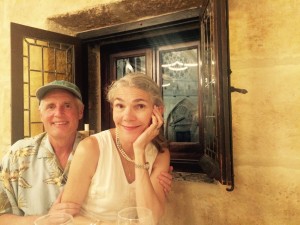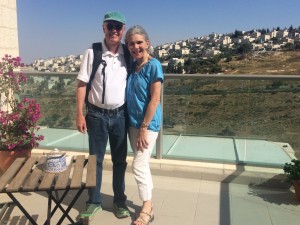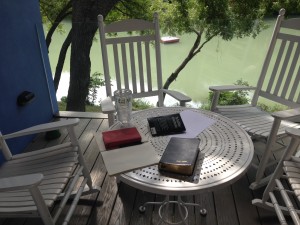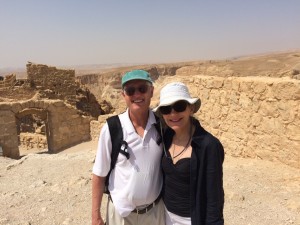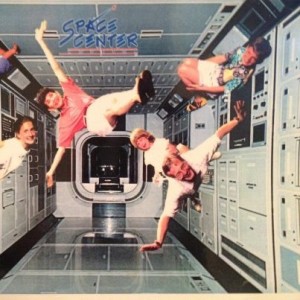One of the most enjoyable parts of our pilgrimage to the Holy Land this summer was a visit to the Dead Sea. For those who do not know, the Dead Sea is the lowest spot on earth, over 420 meters or almost 1400 feet below sea level. The Dead Sea is so salty, that virtually nothing can live in it or on its near shores. It is in the midst of a desert—one of the least hospitable places on earth. The Dead Sea is near where John the Baptist ministered and where the so-called Dead Sea Scrolls were found.
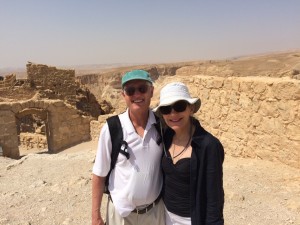 The Jewish fortress of Masada, built by Herod the Great, is near the Dead Sea, so it is almost always on tours of the Holy Land. It is extremely hot, often over 100 degrees. Interestingly, few people get really bad sunburns. Because sunlight has to travel the extra 1300 feet, more ultraviolet rays are blocked. Therefore, the sun gives a good tan, but if you are careful, not much of a burn. (It does require sunscreen.)
The Jewish fortress of Masada, built by Herod the Great, is near the Dead Sea, so it is almost always on tours of the Holy Land. It is extremely hot, often over 100 degrees. Interestingly, few people get really bad sunburns. Because sunlight has to travel the extra 1300 feet, more ultraviolet rays are blocked. Therefore, the sun gives a good tan, but if you are careful, not much of a burn. (It does require sunscreen.)
I have been to the Dead Sea before, and did not like the experience. The sea is salty, so that you cannot really swim. You float on top. It is also oily, and there is sometimes a pitch-like substance along the shoreline. This time was different. I came to enjoy being at the Dead Sea.
Salt and Light are things we take for granted. However, in the ancient world, they were not taken for granted. Salt was and is valuable. Without electric and other artificial lights, oil lamps were the primary way of lighting homes. Jesus uses Salt and Light to express to his followers what it means to be a disciple.
Text of the Day
I don’t have a really good memory. If I could memorize any part of Scripture, however, I think it might well be Matthew 5-7. We know this part of Matthew as “The Sermon on the Mount.” We are told that Jesus preached this sermon on the north shore of the Sea of Galilee. Today, there is a lovely Italian church on the site. He walked up the side of a hill near the sea, sat down, and began to preach. As Matthew tells the story, Jesus began with the Beatitudes. Then, he spoke these words:
You are the salt of the earth. But if the salt loses its saltiness, how can it be made salty again? It is no longer good for anything, except to be thrown out and trampled underfoot. You are the light of the world. A town built on a hill cannot be hidden. Neither do people light a lamp and put it under a bowl. Instead they put it on its stand, and it gives light to everyone in the house. In the same way, let your light shine before others, that they may see your good deeds and glorify your Father in heaven (Matt. 5:13-16).
The Importance of Salt
Most of us spend at least a part of our life trying to limit our intake of salt. We know that too much salt can cause hardening of arteries and other health problems. We tend to have too much salt in our diet. In a culture where there is too much salt in the diet, it is hard to remember that there was a time when salt was expensive precisely because it is necessary to life. Without enough salt, we die.
For about a decade of my life I was a Camp Counselor in the summer time. A good bit of the time, I was a hiking instructor or otherwise had to take campers, most of whom were out of shape, on 5, 10, and 15 mile hikes. One of the things were told to do is to be sure that the campers took salt tablets during the hikes.
I suppose everyone knows that there is salt in our bodies and in our blood. Salt is necessary for the good functioning of our minds and muscles. When we sweat, we naturally lose salt. When we exercise or lose an unusual amount of salt, it needs to be replaced. Otherwise we take in water without salt and lose the correct balance of salt in our bodies. The result can be weakness, dizziness, or even death.
We take salt for granted. Most of the food we eat has plenty of salt in it. However, if were to go back into history just a few years, we would find that farmers and others desired to find land where there were “salt licks,” or natural deposits of salt. A farm with a salt lick would have abundant hunting, because animals (like deer) come to a salt lick to meet their salt needs. Salt would also meet the needs of their family, and salt could be sold to others. Salt is necessary for life.
One of my memories of my father has to do with salt. Every year, just about Christmas time, Dad would salt a side of beef or a ham. It would sit in our garage for a few weeks, and then we would eat ham and eggs and salted beef for weeks. Salt is not only necessary for life, it is a preservative. Salt can be used to prevent disease and decay.
As I learned some weeks ago in Israel, salt can be a healer. Early on, I noticed something interesting: I have a problem with two of my toes due to an old running injury. The persistent infection wonderfully began to heal while we were there. The salt in the Dead Sea is a healant.
There is an old saying that something is like “salt on a wound.” This is because salt can be used to treat infection. It stings when applied, but heals. Some time ago, I had an infection in my gums. The doctor recommended that I use a salt mix as a mouthwash, and sure enough, the infection went away. Salt is a healant.
Finally, salt is a spice. Many foods taste a bit better with salt in them.
When Jesus says, “You are the salt of the earth” (v. 13), he is saying that as we are filled with the Spirit of God, as we live out the life of discipleship, as we connect with others, we become a preservative, a healant, a spice, and a source of life for others. When Jesus says “What good is salt if it loses its saltiness?” he is reminding us that if we dilute our discipleship, if we do not take it seriously, if we fail to live on the basis of the faith we proclaim, we are really not very good disciples.
The Importance of Light
Jesus goes on to say, “You are the light of the world.” Light is one of the most interesting and important theological ideas. In Genesis, God creates light first of all things. John says, “God is light” (I John 1:5):
This is the message we have heard from him and declare to you: God is light; in him there is no darkness at all. If we claim to have fellowship with him and yet walk in the darkness, we lie and do not live out the truth. But if we walk in the light, as he is in the light, we have fellowship with one another, and the blood of Jesus, his Son, purifies us from all sin (1 John 1:5-7).
Many times in Scripture, prophets, wise men, apostles and others speak of the light of God and the light of Christ. Jesus says, “I am the light of the world (John 8:12). At the very beginning of John, the apostle writes:
In the beginning was the Word, and the Word was with God, and the Word was God. He was with God in the beginning. Through him all things were made; without him nothing was made that has been made. In him was life, and that life was the light of all mankind. The light shines in the darkness, and the darkness has not overcome it (John 1:1-5).
In today’s reading, Jesus says of his disciples and us: “You are the light of the world” (Matthew 5:14). It is as if Jesus is saying, “The Divine Light of God which dwells in me also dwells in my disciples. If I am in you and you are in me, then my light will shine into the world through you.” Paul makes this point when he says, “For God, who said, ‘Let light shine out of darkness,’ made his light shine in our hearts to give us the light of the knowledge of God’s glory displayed in the face of Christ” (2 Corinthians 4:6). The very light of God shines into the world through us.
Once again, light has some very interesting properties, many of them similar to the properties of salt. Light illuminates darkness and is necessary for life. In addition to illuminating darkness, and, therefore, being an ancient symbol for truth, light is a preservative. One can dry fish and fruit in the sun. Light is also a healant. This summer, after our trip to the Dead Sea I continued to wear sandals a lot of each day—and my toes were eventually healed (almost). For a long time, doctors have understood that certain psychological disorders are much improved by being out of doors in the sun. Every one of us knows how relaxing a week at the beach can be!
When Jesus says that we are the light of the world, he is saying that, as we are filled with his Spirit and the Light of his presence, we become light for this world of darkness. Our presence can expose darkness in our culture. Our presence can preserve things that are decaying. Our presence can heal lives and neighborhoods that are sick.
This is a small example, but every pastor, Cindy, Don, and I included, can tell you many stories of visiting a person in the hospital, where the very fact of our visit made an improvement in things. We have friends whose acts of kindness and friendship have been instrumental in saving marriages and families. In every city in America there are Christian people who are making a difference in the quality of life in their community. The fact is we are the light of the world.
As I was thinking about this blog, I was thinking about how relaxing a week at the beach can be. Suppose our life goal was just to be as relaxing for our families and friends, just as healthy and life restoring as a week at the beach? Could there be any better ministry?
The Being of Every Day Disciples
 The title of these lessons is “Salt and Light: Everyday Discipleship for Everyday Christians.” Last spring, God convicted me that much of my teaching about evangelism and discipleship implicitly indicated to people that to be a good disciple of Christ you needed to be “radical.” There are a lot of Christian teachers out there who emphasize this aspect of Christian faith. A negative of this approach is that it implicitly implies that ordinary people who have ordinary lives and spend most of their time with family, at work, and among friends must completely alter their lives and change what they are doing in order to be true, disciple making, followers of Christ. This is not true! Wc can incorporate being a motivated disciple of Christ into our everyday way life—and we should!
The title of these lessons is “Salt and Light: Everyday Discipleship for Everyday Christians.” Last spring, God convicted me that much of my teaching about evangelism and discipleship implicitly indicated to people that to be a good disciple of Christ you needed to be “radical.” There are a lot of Christian teachers out there who emphasize this aspect of Christian faith. A negative of this approach is that it implicitly implies that ordinary people who have ordinary lives and spend most of their time with family, at work, and among friends must completely alter their lives and change what they are doing in order to be true, disciple making, followers of Christ. This is not true! Wc can incorporate being a motivated disciple of Christ into our everyday way life—and we should!
This does not mean that we do not need to change some things about how we live, work, and relate to others. We need to be filled with God’s Spirit, live wisely, love others unconditionally, and follow Jesus. As we follow Jesus, our lives will change and take a different direction. This probably won’t mean that we change our careers, friendships, location, and the like. In fact many, if not most, Christians, will continue to live where they now live, in the career and occupation they now have, supporting and sharing God’s love with their family, neighborhood, community, friends, and fellow-workers. We are and should be Salt and Light wherever we are. [1]
This brings me to the last part of what Jesus says in our text:
A town built on a hill cannot be hidden. Neither do people light a lamp and put it under a bowl. Instead they put it on its stand, and it gives light to everyone in the house. In the same way, let your light shine before others, that they may see your good deeds and glorify your Father in heaven (Matthew 5:14-16).
We have to be filled with God’s Spirit, otherwise we will have no light of God to share. This is the work of God’s grace. However, we also must shine. We must allow that Grace we have received and the power of God’s wisdom and love to shine in our lives and not hide what God is doing and has done for us. We should not hide our faith under a bucket, we should let it shine into the world.
Amen
Copyright 2015, G. Christopher Scruggs, All Rights Reserved
[1] Those who have been following my blog will see that this is from “A Sower has a Way of Life” (Sunday, August 9, 2015).

